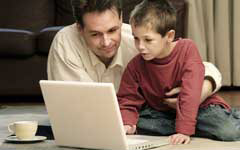
It's estimated that one-third of "all websites contain explicit sexual content. To block that content, parents sometimes use electronic filters. Unfortunately, it is difficult for any filter to adequately screen the thousands of chat rooms that spring up like mushrooms" (Cline and Fay 194).
It can feel like we're fighting a force much larger than ourselves when trying to keep our children safe on the internet.
What are the main things to watch for? What can we do to increase a child's safety?
"It has been estimated that one in five children are solicited online
for sex. According to a recent survey, one in five U.S. teenagers who
regularly log on to the Internet say they have received unwanted
sexual solicitation via the Web" (Cline and Fay
194).
It's a frustrating reality that the
internet, with all its potential for good, is a place we need to be
very watchful.
The internet is like an apple
barrel, "filled with endless worms and rotten apples" (Cline and Fay
194). Danger on the internet includes harmful information
(pornography, for example) and people who intend to harm.
Outside Controls
One great way to increase internet safety is to put the computer in a
high traffic area in your home rather than in bedrooms. You'll be on
hand for questions and it will automatically limit what is
viewed.
Teach kids how predators think and act.
"Never" rules like "never give out any personal information, never
enter private chat rooms, and never agree to meet anyone from a chat
room in person" are wise (www.kidshealth.org).
Filters are a good first defense in
reducing the risk of internet abuse. Unfortunately, however, filters
are not a fix-all. They can't catch everything and teenagers can often
find ways around them.
- Put the computer in a high traffic area
- Teach predator tactics
- Have some "never" rules
- Use filters as a first defense
- Know passwords
- Be involved
Be Involved
We need to be involved in our children's internet
use.
This might mean we take a computer class
(most of us aren't born knowing to use the computer the way our kids
are).
Check credit card bills and phone bills
for any unusual usage that could indicate a harmful person has entered
your child's life.
Use the internet with your
child-”just like you'd watch television shows together-and talk about
safety issues.
Protecting your child includes
your understanding the territory: Are they registered on MySpace.com?
Who are they e-mailing? What websites are their favorites?
Specifics
It's a good idea to be fairly specific with kids when explaining what to look out for in terms of internet safety, especially young children. For example, because pedophiles will often gain access to children through chat rooms, explain that anyone can say they are a twelve-year-old girl, even an older man. Children can be confronted with this at a young age, and their best defense is you.
Report It
"Call the National Center for Missing and Exploited Children at (800) 843-5678 if you are aware of the transmission, use, or viewing of child pornography online. Contact your local law enforcement agency or the FBI if your child has received child pornography via the Internet." (www.kidshealth.org)
Post-It
Have your family computer rules posted by the computer. Consider a copy of the thirteenth article of faith posted there as well.
Use It Together
Using the internet together will allow you to talk about safety issues. It might surprise you what things don't appear dangerous to your child.
Savvy
We've said it once, and we'll say it again. Learning about the internet and the computer can be your best defense. Understanding what it is that your children are facing will allow you to make your best parenting decisions. Taking a computer class might be helpful, even having your child teach you what they know can be helpful.
Passwords
E-mail passwords should be public. Let your child know beforehand that you'll periodically monitor her e-mail account and user history, explaining that it is for her safety. This doubles for access to myspace.com pages, etc.
Be Introduced
Let your child know you want to be introduced to any new online friends they make in chat rooms-just as you'd be introduced to new friends close to home.
Bookmark It
Bookmark your child's favorite websites for quick access to them. This way there's no mistake when she's typing.

Most of our children have never known the world without the internet. One child said to a mom wondering about what family activity one night, "You should ask the internet. It will know."
The internet is a phenomenal tool: Writing a book report isn't what it used to be, shopping for a car isn't what it used to be, finding a recipe isn't what it used to be. The internet has literally changed the landscape of our lives.
Being involved and aware can help you make sure the impact of the internet on your children's lives is a positive one.
Sources
Cline, Foster and Jim Fay. Parenting with Love and Logic. USA: Pinion Press, 2006.